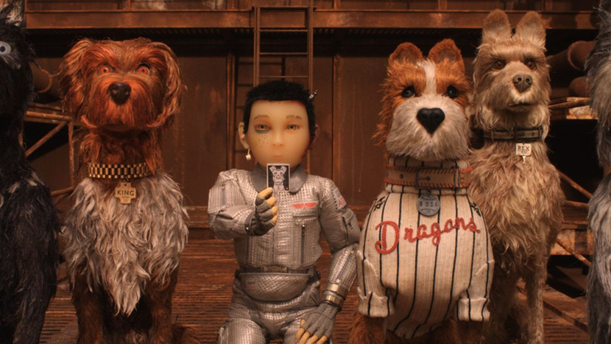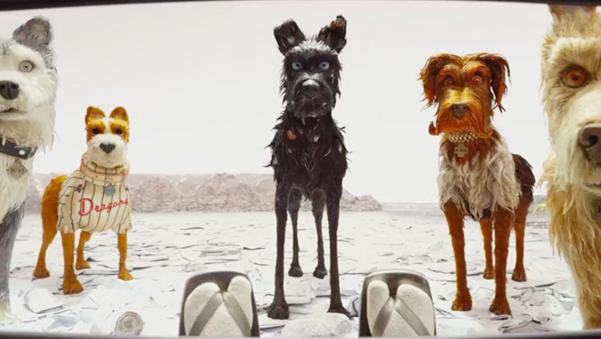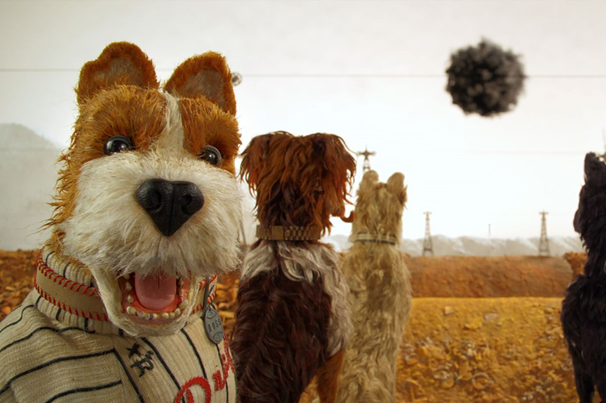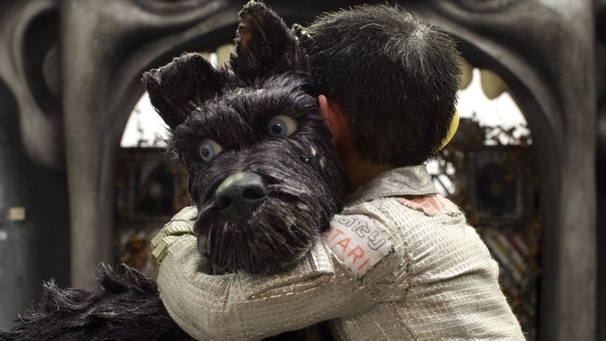This article previously appeared on Crossfader
Director: Wes Anderson
Genre: Comedy
Year: 2018
ISLE OF DOGS may very well be the first film ever made that’s genuinely incapable of being hated (inevitable troll-ish comments below notwithstanding). There is simply no logical argument that can say every meticulous frame isn’t crafted with the love and skill of a filmmaker at the height of his powers, one who now expresses himself in a stop-motion world that he can literally control every single element of in order to reflect his brain to a 100% exactitude. Close as he has come—and strive for as he might throughout his storybook-filtered filmography—he has heretofore been unable to fully and transcendentally accomplish this feat in a live-action world enslaved to organic actors, physics, and location-based restraints, regardless of script.
Some might argue that even the name Wes Anderson has of late represented more of a parody-ripe hipster brand than an art-house auteur (though maybe what’s really to blame are the annoyingly vocal poseurs he’s unintentionally picked up as a representative fan-base). But that same someone would have to possess a severe lack of empathy not to tear up (multiple times) at this portrait of the very sacred bond that exists in a past or present tense between a boy and his dog. And boy, is it refreshing that it is a portrait that doesn’t cheaply go the way of Old Yeller. Though be warned, there are very real consequences abound for the dogs in this fantastical world—a fact that I’ll admit made me fear I wouldn’t enjoy the film before its ineffably delicate touch proved me wrong.

We’re on a mission from DOG
You see, ISLE OF DOGS’ success lies in how it fundamentally reminds you of how much you love or loved your dog, or any platonic companion you hold dear for that matter. Indeed, the film may be the most poignant reminder of how haunting non-sexual love can truly be. Simply put, it is impossible to hate a film that, like a dog, loves you so much.
Set within an unabashedly Anderson-ized Japanese aesthetic as filtered through hazy dreams of Akira Kurosawa’s cinema, the film’s cheeky choice to diegetically play with language (as emphasized by a title card early on) allows us to identify with the dogs’ point of view. The intentional omission of subtitles for Japanese dialogue in one scene leaves us as befuddled as the dogs struggling to understand their human companion, until a very clear gesture tells us the main imperative of that dialogue—“sit!” And so the dogs sit.
Moreover, the film is chock full of profound yet basic observations of canine mannerisms and witticisms. For instance, we understand the pure unadulterated joy a dog is capable of when Chief (Bryan Cranston) tastes a dog treat for the first time and wondrously analyzes its crunchy texture. At the risk of sounding like Anderson’s muse Owen Wilson, it is very hard to keep the word “wow” from slipping out of your mouth as you cinematically witness a defining moment in a dog’s life. An ecstasy that encases the bittersweet totality of the memory of how a dog or a pet affected your life, and what that being felt when they themselves knew true happiness. The whole thing is miraculously capable of inspiring pure empathy even in the coldest audience member ultimately starving for the love that only a dog (or dog-like companion) is able to give.

A bold introduction to this year’s season of TERRACE HOUSE
Food—the quintessential thing that a dog will always bark and moan and beg its master for—subtly plays a central emotional role. In a film full of beautiful, long cinemascope shots against barren landscapes, perhaps the most memorable one sees the band of muts walk along and reminisce on the best thing they ever ate. One remembers a brand of dog food. Another the steak he ate for a birthday meal. One remembers green tea ice cream. The sing-song tone of each individual voice cracks your heart as you too remember the best thing you ever ate. Better yet, perhaps you now remember all the times you generously gave a piece of food to your dog, and only now realize how much it may have meant to him or her. What’s more, perhaps your dog even still dreams of that very morsel of food as you sit there watching the film. It makes me want to cry as I recap the scene. It is so indescribably touching despite how nonchalantly Anderson presents it to us.
The obvious point of comparison would be FANTASTIC MR. FOX, which, while lovely, is a stylistic, simpler rough draft that saw Anderson feeling out the stop-motion medium to later flesh out more substantively. The comparison is like that of Guillermo Del Toro’s rough sketch THE DEVIL’S BACKBONE to his later, fully-formed allegorical opus PAN’S LABYRINTH. In terms of style, it would be reductive to focus for too long on how much of a well-crafted love-letter this is to Kurosawa. Sure, in one scene we are visually reminded of a showdown in SEVEN SAMURAI, or we see that the evil Mayor looks a lot like Toshiro Mifune in HIGH AND LOW, or we hear that Chief is constantly referred to as a STRAY DOG. But a pastiche this is not. In the face of what else this film provides, those dazzling Easter eggs are merely a maraschino cherry, not even the full icing, on top of this dense, delicious black forest cake.

Anderson captures selfie stick mania in stop motion
The whole thing has enough style and detail for 10 movies (going at its whip-fast pace, I certainly missed a lot on first viewing, and so will you). It features an exotic score straight out of a Costa-Gavras film that heel-tappingly pulsates. And like many other Anderson films, I’d still probably be praising it right now if the only thing it had was that style mixed with some deadpan dogs. But it also has a heart bigger than the Grinch’s on Christmas day (himself revitalized by the loyalty of his dog Max).
That’s what separates this from Anderson’s now-in-retrospect colder and relatively more immature efforts. Films which, don’t get me wrong, I have loved and continue to love throughout my career as a cinephile. And even though moments like the jaguar shark climax of THE LIFE AQUATIC and the metaphorical fate of M. Gustave in THE GRAND BUDAPEST HOTEL hinted at the heartstrings, this is the first time that Wes Anderson has grounded his wholly unique style in something so meaningful from start to finish. So powerful, in fact, that I find myself writing about those aforementioned Anderson masterpieces in imperfect lights that lower them from the pedestals upon which they stood as recently as a few days ago. I may wind up rewatching some of those films more than I’ll end up rewatching this one, but that’s only by design. To retain its mystique in memory, ISLE OF DOGS is a Mendl’s pastry, meant only to be eaten on a special occasion like a birthday.

Working Title: Melt my Heart
It doesn’t matter whether you’re a dog person or a cat person (though I’m sure if you’re the former, it can only help). It doesn’t matter whether you’re a discerning cinephile, an Anderson-ite hipster stereotype, or a humble, casual moviegoer. If you’re simply a warm-blooded person, and you breathe, you’re going to love this film almost as much as you love the special relationship you have (or once had) with a dog or a cat or any being that this film reminds you of. It’s a film that will warmly sit in your lap for years to come. And you’ll want to pet it too.
Verdict: Recommend















Comments